-
Genealogy & Names
-
Tourist Information
-
Culture & Reference
|
February 2025 
Obelisk on Killiney Hill Image from Free Photos Of Ireland |


FREE WORLDWIDE DELIVERY FOR A LIMITED TIME find out more |

| Popular Articles from Recent Newsletters: |

|
Hello again from Ireland where Spring is doing its best to break through after what has been a pretty bleak Winter. We just recently had Imbolc, the Gaelic traditional festival that marks the beginning of Spring, so things are looking up! In this month's issue we have to talk about a King and a Queen! Firstly we recall the uncrowned King of Ireland Charles Stewart Parnell,whose fight for Home Rule paved the path for those rebels who were to follow. Our Irish mythology tale is dominated by Clíodhna, the Queen of the Banshees, and Goddess of love and beauty. Those of a certain vintage will certainly remember the economy brand of superstores that flourished in the 1960's and 70's in Ireland. 'Woolworth's is another lyrical tale from Pat Watson that recalls them. This month's 'On Your Hike!' takes us to the southern tip of County Dublin to Killiney Hill Park. And we end with a very old story by Thomas Crofton Croker that recalls the tale of 'Fior Usga' and her fabulous underwater home in Cork.
HELP!!
You can help to keep this newsletter alive by gifting some Family Crest Gifts Jewellery or Crystal to your family or friends at our online shop at IrishNation.com. If you have an article or story you would like to share then please do send it to us. Until next time, Michael 
P.S. Please Do Forward this Newsletter to a friend or relative. If you have a website or Facebook page or Blog (or whatever!) then you can help us out by putting a link on it to our website: www.ireland-information.com
|


|
||||

|
Clíodhna - pronounced: 'kleen-ah' Tuatha Dé Danannan - pronounced: 'two-hah day dan-onn' Clíodhna was the mythical Queen of the Banshees, the female spirits of the Tuatha Dé Danannan, and forever will be associated with the southern part of Ireland and Cork in particular. 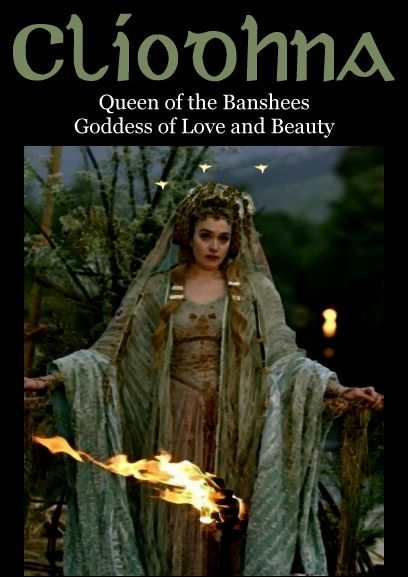
She was a fabulous beauty, perhaps the most beautiful woman in the world. Other tales of Clíodhna are not quite so benign. She is said to have lured sailors to the sea-shore where they would drown, unconcerned as she was with the fate of mere mortals. But it was one such mortal who was to cause her downfall. She left the 'land of promise' in the Otherworld, known as 'Tir Tairngire', to be with her mortal lover Ciabhán (Keevan of the Curling Locks). It was an amazing sacrifice for a Goddess from the Otherworld to remain in the mortal realm but that is what she chose. When one day Ciabhán went off to hunt, Cliodhna remained at the seashore but was swept away by a wave incanted by Manannán MacLir, the sea Deity. Ever since that time the tide in Glandore in Cork is known as 'Tonn Chlíodhna' meaning 'Clíodhna's Wave', especially when a fiercely loud braking wave thunders out from the sea. And since that time Irish legend has it that every ninth wave in a sequence is the strongest, and is known as 'Clíodhna's wave'. Clíodhna was revered by many of the strongest Gaelic families of old. In the 'Annals of the Kingdom of Ireland', Donal III O'Donovan, one of the great ancestors of the O'Donovan families, is referred to as the 'Dragon of Clíodhna': he will remit his authority to none other - he has accepted the law of his dynasty. O'Donovan, Four Masters, vol. V, p. 1548 Perhaps one of the most enduring stories of Clíodhna relates to the famous Blarney Stone. While building his castle in Cork, Cormac McCarthy became involved in legal difficulties and appealed to Clíodhna for her help. In a dream she instructed him to kiss the first stone he found the following morning, and if he did so his problems would be resolved. McCarthy did as instructed and when he argued his cause in the courts found that he was possessed of such eloquence and convincing language that he easily won his case. He honored Clíodhna by having the stone he had kissed set into a wall, where today it is visited and kissed by countless thousands of visitors from all parts of this world. The legend of Blarney was enhanced even more when Queen Elizabeth I found that she could not successfully persuade Cormac McCarthy to surrender his castle to her. Such was his delaying tactics and now superior negotiating skills and turn of phrase that the frustrated Monarch of England described his communications as 'Blarney, as what he says he does not mean'. And so it is that Clíodhna is well remembered in Ireland. Her Palace was near Mallow in Cork at a place that is still called 'Carrig-Cleena', meaning 'Cliodhna's rock'. And every time a massive thunderous wave breaks on the seashore her memory rises from the history of Ireland, echoing from the mythic era that, although now at an end, is never forgotten.  Read more amazing Stories of Irish Legends and Mythology. |


find out more |




find out more |

|
Smart, well-travelled people, who had been to Dublin, knew all about Woolworth's nick-knack shop. They sold everything under the sun, from a needle to an anchor. Anybody who had never been there was backward. Then, wonderful news arrived. They were going to open a shop in our town. 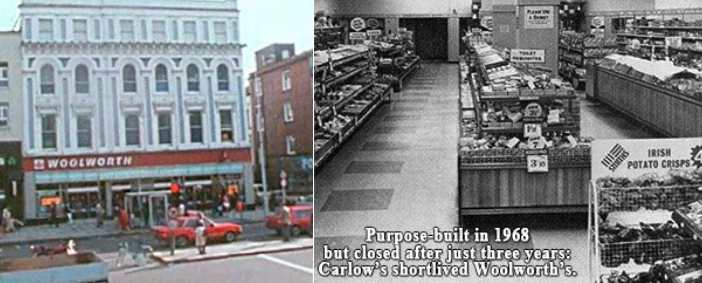 Even the war, the rationing and the
coupons could not dampen our enthusiasm at the
great news. They had acquired the building,
work on its renovation was proceeding, and it
would be open for Christmas. Santa Claus would
be there, we had heard, but we did not really
believe that he visited the Dublin shop every
year. Now we could see for ourselves. Just
because you were only seven didn't mean you
were stupid.
Even the war, the rationing and the
coupons could not dampen our enthusiasm at the
great news. They had acquired the building,
work on its renovation was proceeding, and it
would be open for Christmas. Santa Claus would
be there, we had heard, but we did not really
believe that he visited the Dublin shop every
year. Now we could see for ourselves. Just
because you were only seven didn't mean you
were stupid.
When the sign over the new shop went up everybody said that the spelling was wrong, 'Wellworths'. They supposed it would be noticed and put right by next week but it wasn't. Instead we heard that it was not the real Woolworth's at all but a copycat company. However they would have many of the same things, nearly as good. The question was would they have packs of small playing cards selling for sixpence. A full size pack cost a half a crown. 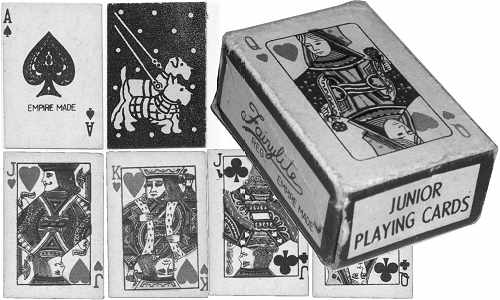 'Haven't ye your father's playing cards, aren't
they good enough.'
'Haven't ye your father's playing cards, aren't
they good enough.'That's what Mammy said. Daddy's playing cards were several years old and there were only thirty-seven left out of the original pack and even those were in poor condition. They were dog-eared and marked so that many of them were recognisable from the back. This led to cheating by the older members of the family. I had learned to count on the cards long before I went to school. There were forty-five in the pack then. I heard there were several games you could play if you had all fifty-two cards but we had only two games, strip-jack (beg of my neighbour) and casino. Only two could play strip-jack so casino was usually played. In this game every player got four cards and there were four cards placed face up on the table. If the first player had a card in his hand matching one on the table, he could put both in his bank. Sometimes he could pick two or three cards off the table if their number added up to a card in his hand, for instance a two a three and a four could be picked up by saying two plus three plus four equals my nine. He could then put all four cards in his bank. If he had no match he just had to leave down a card. Deals continued until all the cards were gone and whoever had the biggest bank won. When my aunt gave me sixpence in town, during the Christmas week that Wellworth's opened I decided to look for the little playing cards. That was the first day Santa was there and the crowds were huge. Behind the two girls at the door there was a long queue of children and parents and at the end of the line was a fake Santa. I might have been only seven years old but everybody knew Jim Farrelly. One of the door girls grabbed me. 'Give me your shilling and then you can join the queue for Santa.' I glared at her. 'I don't want to go to Santa I just want a pack of playing cards for my six pence.' 'You cannot go to Santa unless you have a shilling.' 'I don't want to go to Santa' and I ducked under her arm and ran down the shop with her after me. The manageress appeared, 'What's all the fuss?' 'He won't line up for Santa.' 'I want a pack of playing cards and I only have sixpence.' She took the sixpence and gave me the most beautiful little box with a king of diamonds on the outside. Now it was the door girl's turn to glare. Now! We'd see who would cheat, who would claim that three and four was eight, who would read the backs of the cards. The owner of the cards would call the tune. Anybody caught cheating would be put out of the game. It was great to be a man in charge of his own cards. Pat Watson 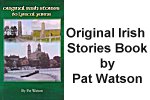
'Shy Man' is one of sixty lyrical yarns from 'Original Irish Stories' by Pat Watson, Creagh, Bealnamulla, Athlone, Ireland. First published in May 2006. Visit: Barnes & Noble or you can email the author here: pjwatson77@gmail.com |


View the Archive of Irish Phrases here: http://www.ireland-information.com/irishphrases.htm |

|
The winner was: annemareedoyle@yahoo.com.au who will receive the following: A Single Family Crest Parchment (usually US$29.99) Send us an email to claim your Parchment, and well done! Remember that all subscribers to this newsletter are automatically entered into the competition every time. I hope that you have enjoyed this issue! 
by Michael Green, Editor, The Information about Ireland Site. https://www.ireland-information.com Contact us (C) Copyright - The Information about Ireland Site, 2024. 17 Páirc Ghrainbhil, Carraig Dubh, Contae Baile Átha Cliath, Ireland Tel: 353 1 2893860 |

|
MARVELOUS GIFTS FOR ANY OCCASION FREE DELIVERY TO YOUR DOOR 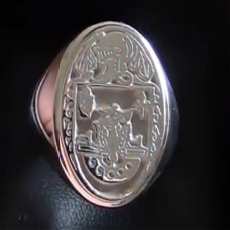
BIG REDUCTIONS! Stunning Family Crest Signet and Seal Rings 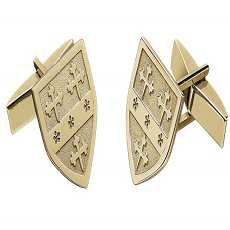
DISCOUNTED FOR A LIMITED TIME Elegant Cufflinks 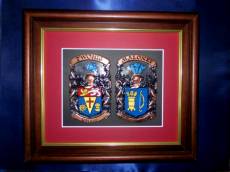
Incredible Family Crest Plaques Made in Ireland 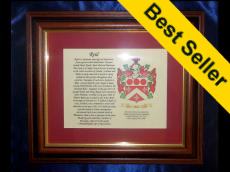
Superior Framed Family Crest Parchments 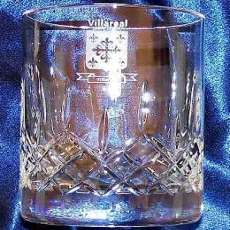
Gorgeous Glistening Galway Crystal 'Your-Name' Old Irish Sign NEW DESIGNS! 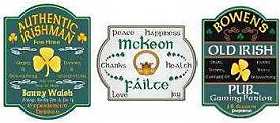
From US$34.99 - Free Delivery 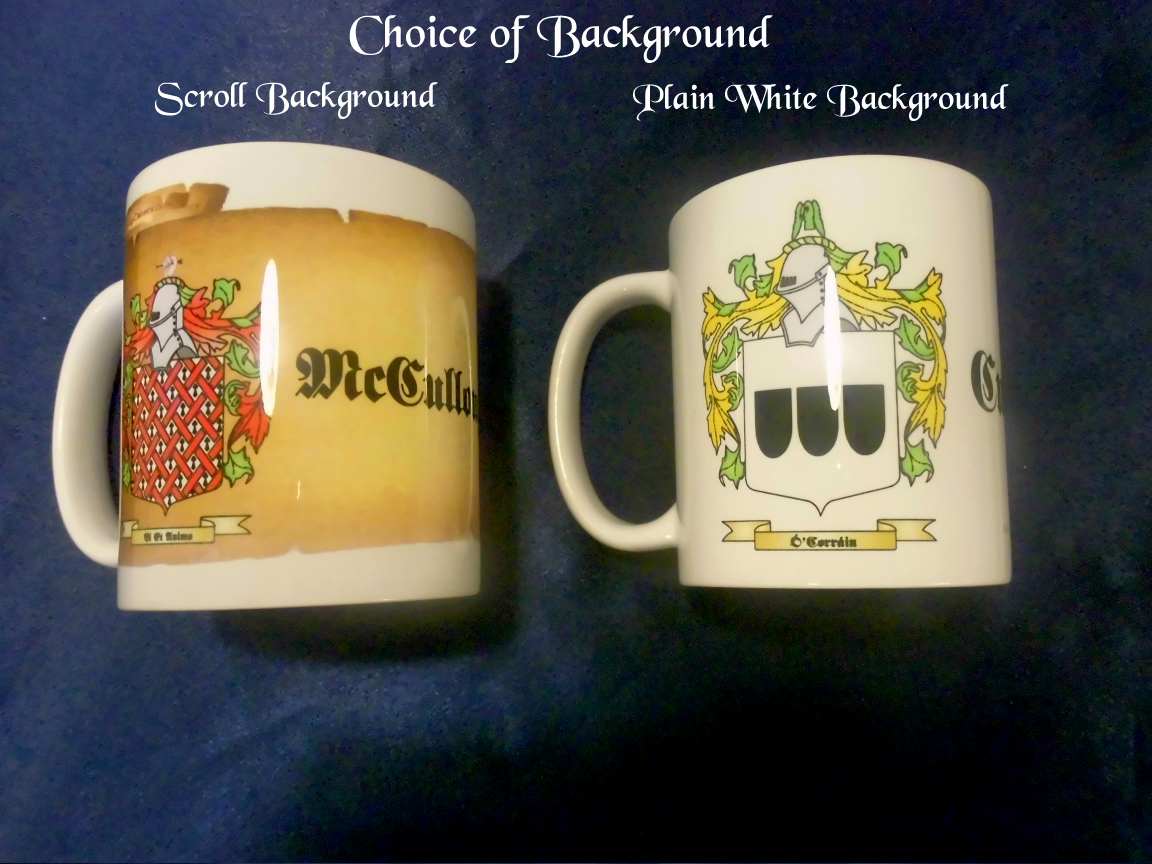
New Designs available on our Coffee Mugs 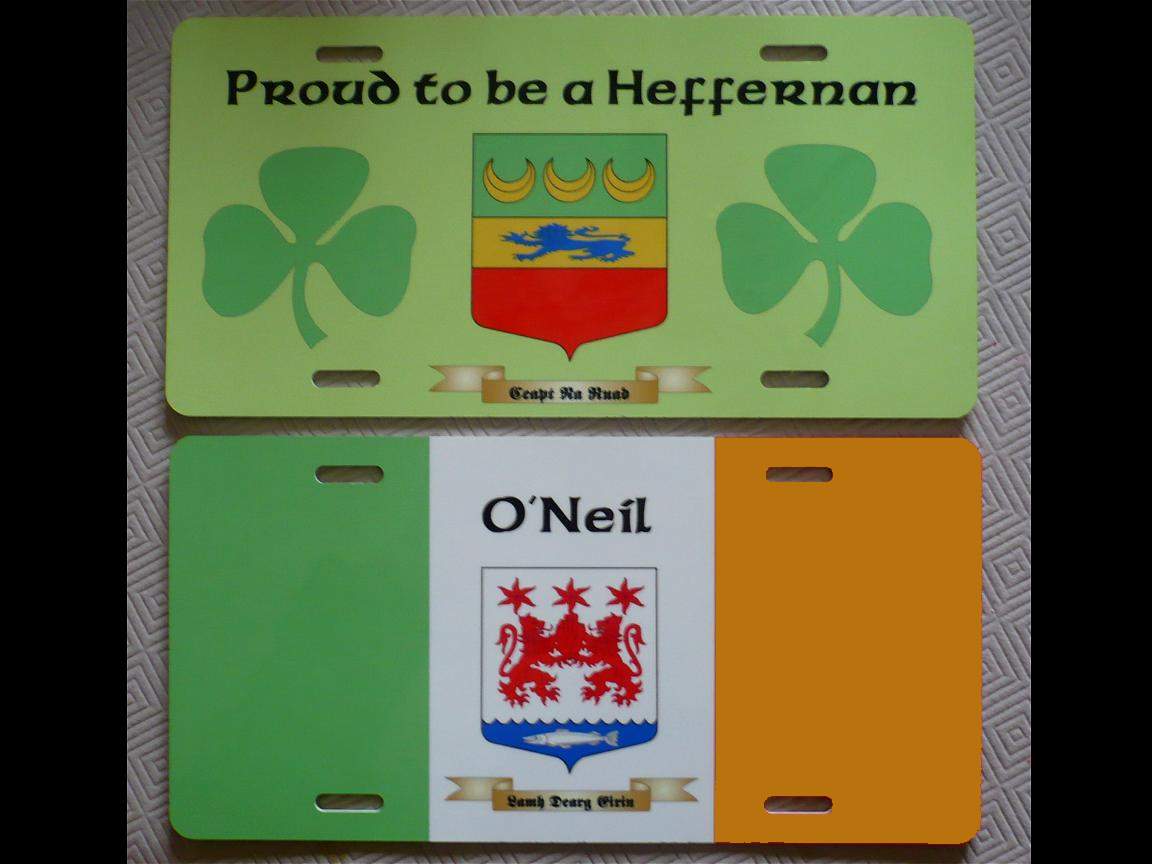
Personalized Licence Plate 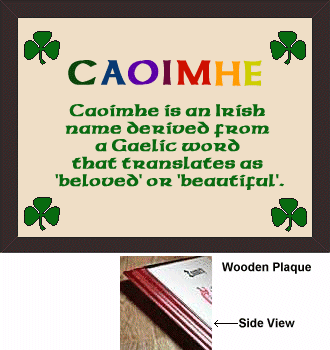
Personalized First Name Plaque. Great for Kids! 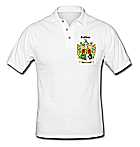
'Your-Name' Polo & Tee Shirts 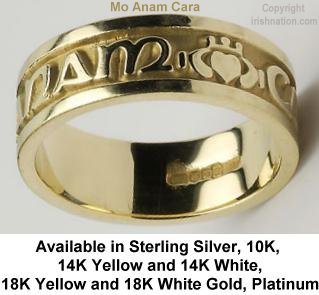
From US$69 Delivered BIG REDUCTIONS! Stunning Engraved Rings from Ireland with Irish Language Phrases. Mo Anam Cara: My Soul Mate Gra Dilseacht Cairdeas: Love, Loyalty, Friendship Gra Go Deo: Love Forever Gra Geal Mo Chroi: Bright Love of my Heart SEE MORE GREAT OFFERS AND DISCOUNTS AT: IRISHNATION.COM FREE DELIVERY FOR A LIMITED TIME! |
